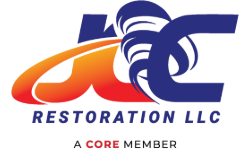Structural drying is the process of removing water from a building after a water damage event. The goal of structural drying is to return the building to its pre-loss condition as quickly and safely as possible.
There are many different techniques that can be used to dry a building, and the most appropriate method will depend on the type of water damage, the materials involved, and the size of the affected area.
Some of the most common structural drying techniques include:
1. Air Drying
Air drying is the simplest and most effective way to dry many materials. It involves using fans and dehumidifiers to circulate air and remove moisture from the air.
2. Dehumidification
Dehumidification is a process that removes water vapor from the air. This can be done with a variety of different devices, including dehumidifiers, desiccant systems, and refrigerant dehumidifiers.
3. Vacuum Drying
Vacuum drying is a process that uses a vacuum to remove water from porous materials. This method is often used to dry carpets, upholstery, and clothing.
4. Freeze Drying
Freeze drying is a process that uses cold temperatures to remove water from materials. This method is often used to dry food, documents, and electronics.
5. Infrared Drying
Infrared drying is a process that uses heat to remove water from materials. This method is often used to dry wood, plaster, and concrete.
6. Radiant Heating
Radiant heating is a process that uses radiant energy to remove water from materials. This method is often used to dry wet insulation, gypsum board, and paper.
7. Ultrasonic Drying
Ultrasonic drying is a process that uses sound waves to remove water from materials. This method is often used to dry textiles, leather, and paper.
8. Vacuum Freeze Drying
Vacuum freeze drying is a process that uses a vacuum and cold temperatures to remove water from materials. This method is often used to dry food, pharmaceuticals, and electronics.
9. Wet Vacuuming
Wet vacuuming is a process that uses a vacuum to remove water from materials. This method is often used to dry carpets, upholstery, and clothing.
10. Water Extraction
Water extraction is a process that uses pumps and vacuums to remove water from materials. This method is often used to dry carpets, upholstery, and clothing.
https://www.restorationmasterfinder.com/restoration/structural-drying/
https://www.IICRC.org/consumers/care/water-damage-restoration/
https://www.SERVPROnorthwestaustin.com/water-damage-restoration-process
